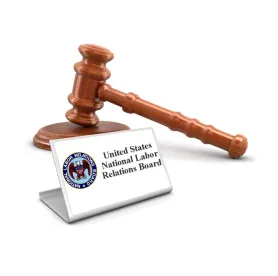Late summer brings picnics, hiking, and general fun. It also brings a slew of NLRB decisions as the agency’s fiscal year comes to an end on September 30. One of the more highly-anticipated decisions concerns the lawfulness of employer work rules. On August 1, 2023, the National Labor Relations Board (Board) issued a decision in Stericycle, Inc., 372 NLRB No. 113 (2023) overruling existing precedent and establishing a stricter test that may render some existing work rules facially unlawful. Stericycle, which had been briefed and pending for over a year, brings us full circle by returning to an earlier (and modified!) test.
Existing Precedent: Boeing
In The Boeing Company, 365 NLRB No. 154 (2017) (Boeing), the Board established a balancing test between the potential impact on the employee’s rights under Section 7 of the National Labor Relations Act (NLRA) and the employer’s legitimate justifications associated with the rule. The Board set forth three categories to classify work rules, although the Board noted that these categories were not part of the test. In short, Category 1 policies were always lawful, Category 2 policies were subject to individualized scrutiny, and Category 3 policies were always unlawful.
Boeing and its progeny evaluated work rules from the perspective of a reasonable employee to determine whether they would reasonably construe a work rule to restrict their Section 7 rights. The Board criticized earlier tests which only required that an employee hypothetically could construe the rule as limiting their Section 7 rights.
Earlier Test: Lutheran Heritage
The Board in Martin Luther Memorial Home, Inc. d/b/a Lutheran Heritage Village-Livonia, 343 NLRB No. 75 (2004) set forth a three-prong test in evaluating work rules. Boeing only overruled the first prong of Lutheran Heritage in which the rule is evaluated to determine whether employees “would reasonably construe the language to prohibit Section 7 activity.” However, subsequent cases applying this test arguably departed from the Lutheran Heritage test by inquiring only whether the rule could be reasonably construed to have a coercive meaning—holding that ambiguous work rules should be construed against the employer.
New Standard: Stericycle
In Stericycle, the Board established a new test which “builds on and revises the Lutheran Heritage standard.” The test first requires the General Counsel to show that a challenged rule has a reasonable tendency to chill employees from exercising their Section 7 rights. This analysis is from the perspective of a reasonable employee who is subject to the rule, economically dependent on the employer, and who is considering exercising their Section 7 rights. The rule is presumptively unlawful if the General Counsel establishes that a reasonable employee could reasonably interpret the rule to have a coercive meaning.
However, the Board left open an opportunity for an employer to rebut the presumption by proving that the rule advances legitimate and substantial business interests that cannot be achieved with a more narrowly-tailored rule.
In overturning Boeing, the Board noted that the balancing test gave too much weight to employer interests, failed to consider the “economic dependency” of employees on the employer (i.e., employees would likely construe ambiguous work rules as prohibiting their Section 7 rights because they do not want to be disciplined or discharged), and unjustifiably categorized certain rules as always lawful.
The Dissent:
In dissent, Member Kaplan noted that it was the purported progeny of Lutheran Heritage – not Boeing – that departed from its standard by changing the test from whether an employee “would” construe to whether an employee “could” construe the rule as coercive. That is, both Boards would hold lawful a work rule even if the rule could be read to restrict Section 7 rights if a reasonable employee would not interpret it that way. Thus, it was Boeing that was more faithful to Lutheran Heritage because both Boards gave considerable weight to an employer’s legitimate interests advanced by the rule in addition to its potential chilling effect on the exercise of employees’ Section 7 rights. Now, the Board’s new “hypervigilant” test will likely make many general rules (e.g., civility and decorum rules) unlawful because they theoretically could restrict Section 7 rights.
Takeaways:
This decision likely will result in testing of employer policies through the filing of charges and more Board decisions applying the test. As we have noted in the past, pure handbook violations are seemingly minor, but can serve to block representation elections, overturn elections where the employer has prevailed, and otherwise chew up resources all without a discernible impact on employees. Employers should reevaluate their work rules to consider whether their rules could be interpreted to restrict Section 7 rights. Employers may also consider adding disclaimers for Section 7 activity; however, the Board has not yet considered the legal sufficiency of these safe harbor provisions in the context of this new standard. Accordingly, careful drafting of work rules is paramount to avoid such rules being found unlawful.





 />i
/>i
